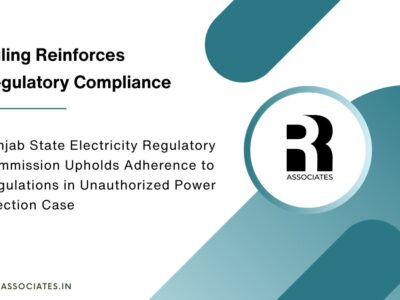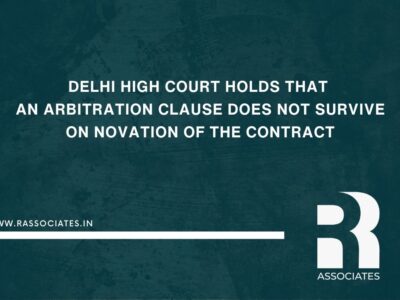
Discretion of the Adjudicating Authority under Section 7 of the IBC
In the recent matter of M Suresh Kumar Reddy v. Canara Bank and others (11th May, 2023), the Supreme Court clarified the position of law with respect to the discretion of the Adjudicating Authority to admit an application under Section 7 of the Insolvency and Bankruptcy Code, 2016 [‘Code’]. Emphasising the satisfaction of existence of default to be the most determinative pre-condition to the admission of an application under Section 7 of the Code, the Bench upheld the view taken in the case of Innoventive Industries Limited v. ICICI Bank and Another [‘Innoventive Industries’] as the settled law on admission of Section 7 applications.
Background of the Appeal
The Respondent- Canara Bank (formerly, Syndicate Bank) issued a letter of sanction to the Corporate Debtor- M/s Kranthi Edifice Private Limited granting credit facilities of:
- a secured overdraft facility of Rs. 12 crores, and
- a Bank Guarantee Limit of Rs. 110 crores, valid up to 28.02.2017.
On default of the above debt, the Respondent filed an application under Section 7 of the Code before the National Company Law Tribunal [‘NCLT’], Hyderabad for initiating a Corporate Insolvency Resolution Process [‘CIRP’] against the Corporate Debtor. The NCLT admitted the said application vide its Order dated 27.06.2022 and thereby declared a moratorium under Section 14 of the Code.
The Appellant- M Suresh Kumar Reddy thereafter preferred an Appeal to the National Company Law Appellate Tribunal [‘NCLAT’] against the Order of admission passed by the NCLT. However, the NCLAT dismissed the Appeal vide its Order dated 05.08.2022. Aggrieved by such dismissal, the Appellant filed the present appeal before the Supreme Court, challenging the extent of discretion available to the Adjudicating Authority while admitting an application under Section 7 of the Code.
Submissions
The Appellant attributed its default to the failure of the Respondent Bank to extend the Bank Guarantees despite the requests made by the Corporate Debtor as well as the Government of Telangana. The primary contention of the Appellant was that the NCLT could not have admitted the said application under Section 7 when the Respondent Bank was restrained from taking coercive steps pursuant to letters of invocation of Bank Guarantees. Further, the Appellant relied on the Judgment passed by the Supreme Court in Vidarbha Industries Power Limited v. Axis Bank Limited, [‘Vidarbha Industries’], to submit that the NCLT could refuse admission of an application under Section 7 of the Code, for good reasons.
On the other hand, the Respondent submitted that the judgment in Vidarbha Industries is contextual and, the settled position of law as laid down in Innoventive Industries and E.S. Krishnamurthy and others v. Bharath Hi-Tech Builders Private Limited [‘E. S. Krishnamurthy’], elucidates that once the NCLT is satisfied that there is a financial debt and a default has occurred, it is bound to admit an application under Section 7 of the Code.
Judgment and Analysis
The Bench laid emphasis on the Judgments in the case of Innoventive Industries and E. S. Krishnamurthy to hold that once NCLT is satisfied that the default has occurred, there is hardly a discretion left with NCLT to refuse admission of the application under Section 7, and the NCLT may reject such applications only when the NCLT finds that there is a debt, but it has not become due and payable.
Further, in view of the reliance placed by the Appellant on the decision of the Supreme Court in Vidarbha Industries, the Bench clarified that the observations were made in the context of the case at hand, and the decision in the case of Vidarbha Industries cannot be read and understood as taking a view which is contrary to the view taken in the cases of Innoventive Industries and E.S. Krishnamurthy.
Outlining the principles of interpretation, the Bench relied on the Judgment passed in the Review Petition filed in Vidarbha Industries to observe that judicial utterances and/or pronouncements are in the setting of the facts of a particular case, and the words of the Judges interpreting statute are not to be interpreted as statutes.
In any event, even if the Bench were to assume that the NCLT has powers to reject the Section 7 application for good reasons, as alleged by the Appellant, in the facts of the case, the conduct of the appellant is such that no such good reason existed on the basis of which NCLT could have denied admission of the application under Section 7.
Conclusion
According to Section 7 of the Code, while adjudicating an application filed by a financial creditor for initiating CIRP, the Adjudicating Authority must be satisfied:
- that there is an existence of default
- that the application is complete
- that no disciplinary proceedings are pending against the proposed Resolution Professional.
In this regard, Clause 7 of the Notes on Clauses appended to the Insolvency and Bankruptcy Code, 2015 states that:
“Once the adjudicating authority/tribunal is satisfied as to the existence of the default and has ensured that the application is complete and no disciplinary actions are pending against the proposed resolution professional, it shall admit the application.”
This view was further reinforced through the Banking Law Reform Committee which lays down the rationale of the Code. The Code assumes that under situations of stress in the entity, the debtors and creditors have already gone through negotiations to reach a solution to keep the entity as a going concern, and CIRP is conducted as a last recourse to resolve conflicts in the negotiations. In these circumstances, a discretion to reject Section 7 application may be misused the Corporate Debtors to delay resolution.
The position of law was further clarified in the judgment passed by the Supreme Court in Innoventive Industries and E.S. Krishnamurthy wherein it was held that the only pre-conditions in a Section 7 application at the admission stage is ascertaining the existence of default. Any other criteria cannot be used as leverage to the Adjudicating Authority to reject the application when all the elements enumerated in Section 7(3) are fulfilled.
The Supreme Court in the Review Petition filed by Axis Bank in Vidharbha Industries has already clarified that the judgment in Vidarbha Industries is contextual and should not be read as provisions of statute. In the present matter, the Supreme Court has settled that the judgment in Vidarbha Industries is not to be read/applied contrary to the view taken on the admission of Section 7 application in Innoventive Industries and E.S. Krishnamurthy.
Without prejudice to the above, even if the Adjudicating Authority has discretionary powers with respect to admission of an application under Section 7 of the Code, the same cannot be exercised to arbitrarily reject Section 7 applications and such exercise must be aligned with the intent and purpose of the Code.
Understanding Section 7 of IBC and Adjudication Authority
Section 7 of the Insolvency and Bankruptcy Code (IBC) pertains to the initiation of the corporate insolvency resolution process by a financial creditor. The adjudicating authority, often a National Company Law Tribunal (NCLT), plays a key role in resolving IBC cases and applying the law. IBC case laws are judicial precedents that help interpret and clarify the application of the IBC. Discretion in law refers to the authority granted to decision-makers to make choices based on their judgment within legal bounds. Overdraft limits under the IBC are specific to individual cases and may vary based on financial creditor claims and the nature of the insolvency situation.




